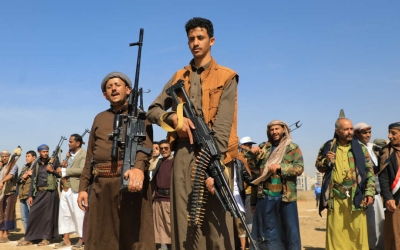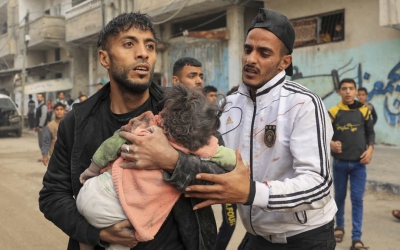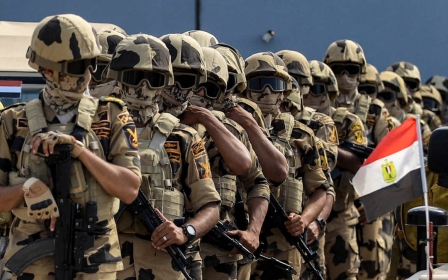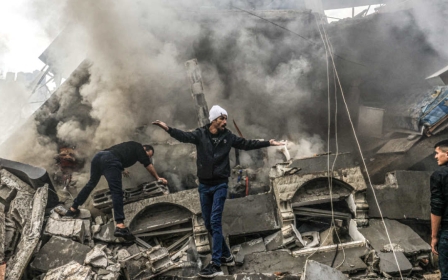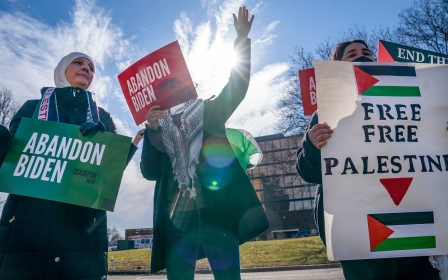War on Gaza: US red line on Rafah blurs as Israeli offensive and hostage negotiations collide
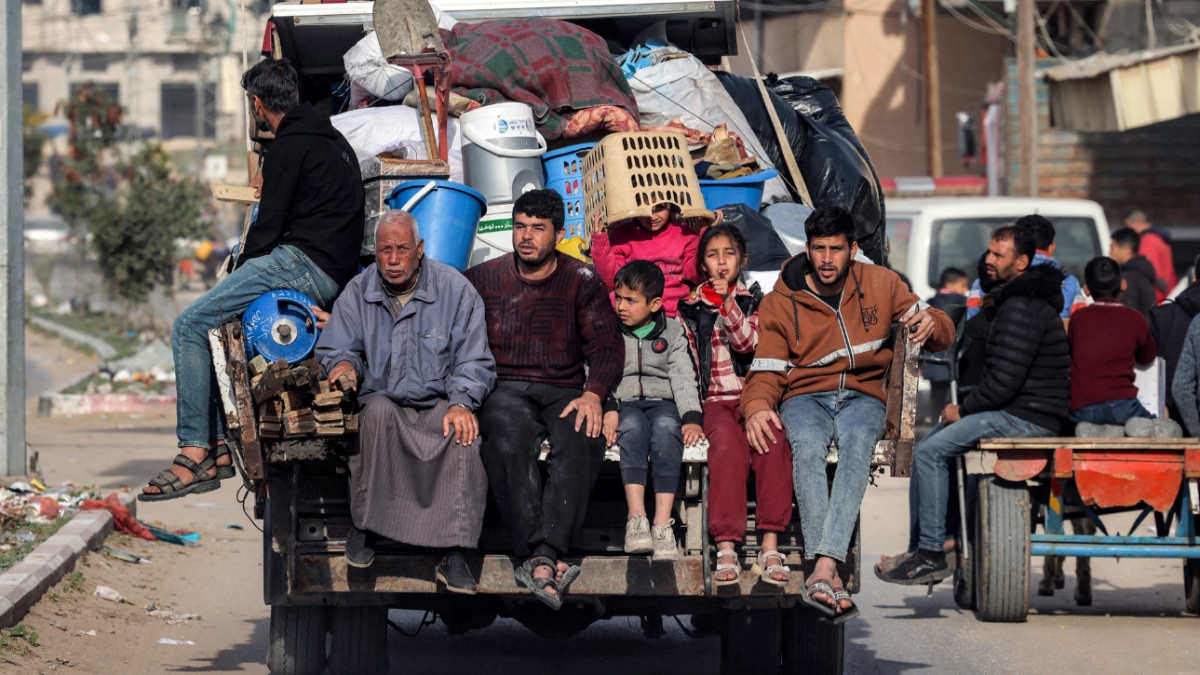
The Biden administration is making a high-level pitch to bridge divides between Hamas and Israel on a prisoner deal to halt fighting in Gaza, as it downplays fears of an imminent Israeli ground offensive in Rafah.
Israel pummelled the Gaza border town of Rafah early Monday, where 1.4 million Palestinians have sought refuge during the war.
The strikes, according to Israel, were cover for an elite military unit that freed two hostages from a second-story apartment in the city along Egypt’s border. Palestinian health officials said the strikes killed at least 67 people.
The raid, which came three days after Prime Minister Benjamin Netanyahu said he ordered Israel’s military to prepare a plan to "evacuate" Palestinians from Rafah, fuelled worries that Israel was on the cusp of starting a new, and likely bloody, offensive in a city teeming with refugees.
"It's not our assessment that this air strike is the launch of a full-scale offensive happening in Rafah,” State Department spokesman Matthew Miller told reporters on Monday, at a briefing where he was pressed repeatedly about Israel’s designs in Rafah which have triggered a wave of international opposition.
The deadly military operation and successful rescue of two hostages held by Hamas, adds a new twist to the plot of a complex diplomatic path the US is pursuing to pause fighting in Gaza.
The assault comes one day before CIA director Bill Burns is set to meet Mossad chief David Barnea along with Egypt’s spymaster Abbas Kamel and Qatar’s Prime Minister Mohammed bin Abdulrahman Al Thani in Cairo for talks to halt the war, former US officials confirmed to MEE.
'The red line that Washington drew wasn’t that red to begin with. It was light pink, and it's getting lighter each day'
- Khaled Elgindy, Middle East Institute
President Biden said last week he was “working tirelessly” to reach a truce and exchange of prisoners between Hamas and Israel that he hoped could be extended to a “sustained pause in the fighting”.
President Biden’s support for Israel is emerging as a political liability for him among a small but crucial progressive voting block going into the US general election. More than 28,000 Palestinians have been killed by the Israeli offensive in Gaza since October, a majority of them women and children, according to Palestinian health officials.
But Netanyahu has poured cold water on hopes of reaching a truce, arguing that Israel’s stated war aims, which include destroying Hamas and freeing the roughly 130 hostages still being held in Gaza, are best served by continuing fighting. Last week he called Hamas’s ceasefire proposal "delusional".
Israel’s successful hostage rescue comes after a series of embarrassing blunders that included its troops killing three hostages who escaped while carrying white flags.
“It boosts the efforts of a beleaguered prime minister [Netanyahu], validates among the Israeli public that operating in Gaza must continue and provides ammunition to use against an American president who is opposed to continued fighting,” Aaron David Miller, a former US Middle East negotiator now at the Carnegie Endowment for International Peace, told MEE.
'We need access to the border'
An assault on the southern city has also been publicly backed by Netanyahu’s political opponent and current Israel war cabinet member, Benny Gantz, who said “broad action in Rafah..is not in question”.
A full-scale Israeli offensive in Rafah would be particularly embarrassing for the Biden administration and could have knock-on effects on the US’s Arab allies.
Biden threw the US’s full weight behind Israel’s military campaign after 7 October, when Hamas and other armed Palestinian groups killed about 1,139 people and took 250 hostages back to Gaza.
But the administration drew a red line on military action that could lead to a forced displacement of Palestinians outside of Gaza. Most of the Palestinians in Rafah have already been displaced from their homes and live in squalid conditions with little access to food, water or medicine.
Yoel Guzansky, an expert at the Institute for National Security Studies (INSS) in Tel Aviv, told MEE that an operation in Rafah was viewed as critical to Israel’s war aims because Egypt has failed to crack down on weapons smuggling between Gaza and Sinai, which Hamas officials have acknowledged feeds the group's arsenal.
“The Egyptians are not doing a good job and someone needs to say it out loud,” he told MEE.
“So we need access to the border with Egypt. That’s the key. Without that, there is no win against Hamas.”
In anticipation of a potential attack, Egypt has reinforced its border with tanks and armoured personnel carriers. Cairo is concerned that an Israeli attack could spark an exodus of Palestinians to the Sinai peninsula, where it has spent years fighting an insurgency including against local affiliates of the Islamic State militant group.
“If a stray missile hits the border fence it wouldn’t surprise me to see a mass exodus into Sinai,” Khaled Elgindy, director of the Middle East Institute’s Israeli-Palestinian affairs programme, told MEE.
'Pink line'
Last week, the Biden administration said it would not support an Israeli operation in Rafah, with National Security Council spokesman John Kirby calling the idea “a disaster”.
However, on Monday the administration left room for backing an offensive. State Department spokesperson Matthew Miller said the US was waiting to see the details of an Israeli proposal to protect civilians in Rafah ahead of an assault.
He added that the US needed to see a “credible” plan to protect civilians that “should be executed before they [Israel] launch a military campaign”.
Elgindy said he believed the US was giving in to Israel’s escalation. “The red line that Washington drew wasn’t that red to begin with. It was light pink, and it's getting lighter each day.”
But a former senior US official, familiar with the White House’s thinking, said officials believed Biden’s phone call with Netanyahu on Sunday, where he warned against an assault, likely prevented a full-scale attack.
“There were clear signs it was in the works over the weekend,” the former official told MEE.
Aaron David Miller, at the Carnegie Endowment, said he didn't believe a full-scale Israeli offensive in Gaza was imminent because Israel would likely need to displace hundreds of thousands of civilians, which could take weeks.
The Biden administration is also concerned about Israel launching a major offensive at the beginning of March, when the holy month of Ramadan begins, he said.
In a meeting on Monday with Jordan's King Abdullah II at the White House, Biden reaffirmed his opposition to forced displacement saying Palestinians in Rafah needed to be "protected."
'[The administration] are so tethered to the Israeli war that creating an open breach with Netanyahu will leave them with no policy'
- Aaron David Miller
Biden looked on as the Jordanian Monarch, a key US ally, issued a stark warning from the White House podium.
“We cannot afford an Israeli attack on Rafah. It is certain to produce another humanitarian catastrophe," he said.
But Aaron David Miller said that the Biden administration may be wary of a wider public split with Israel on Rafah as it tries to coax its ally to agree to a pause in fighting with high-level negotiations set to take place Tuesday in Cairo between American, Israeli and Arab spy chiefs.
“The administration understands that it is in an investment trap. They are so tethered to the Israeli war that creating an open breach with Netanyahu will leave them with no policy,” Aaron David Miller said.
“Rafah is not the fulcrum from which US policy on Israel and Hamas is going to be waged. They want a hostage deal. You can hang a 'closed for the season' sign if the US doesn’t get that done.”
Middle East Eye propose une couverture et une analyse indépendantes et incomparables du Moyen-Orient, de l’Afrique du Nord et d’autres régions du monde. Pour en savoir plus sur la reprise de ce contenu et les frais qui s’appliquent, veuillez remplir ce formulaire [en anglais]. Pour en savoir plus sur MEE, cliquez ici [en anglais].


